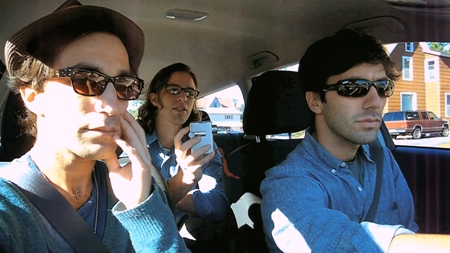The main quandary surrounding the 2010 documentary Catfish is whether it is real or staged, but this is one of those documentaries for which the validity of the footage matters less than the message being conveyed. Sure, that sounds a bit hokey and conjures memories of James Frey being praised and then lambasted by Oprah, who bought into his “memoir,” A Million Little Pieces, but Catfish is different in that the extremely visceral, exaggerated images in Frey’s novel were tolerated because they were supposed to be real, which solidified the intrigue and compassion for Frey’s character.
When the novel’s deceptions were uncovered, the hyperbolic moments were exposed for what they were: snuff. In Catfish, there are no outlandish events, just an illustration of how communication networks – in this case, Facebook – provide individuals with the opportunity to re-imagine their lives and cultivate a false reality.
While this approach to social networks isn’t novel, Catfish shows us the emotional side of deception as opposed to luring us into the home of a pedophile or a man pretending to be a woman to lure an unassuming man into a trap. Catfish gives us Nev Schulman, a photographer, whose work has been stumbled up on by Abby, a nine-year-old artist who transforms Nev’s photographs into paintings that are being peddled in art shows all over Michigan.
In numerous correspondences through packages, letters and Facebook, Nev develops a friendship with Abby and eventually becomes her “friend,” and by default, “friends” with everyone in her family, including her mother Angela, her brother Ryan, and her sister Megan Faccio, a thin, photogenic blonde with whom Nev shares a wealth of common interests.
And here is where Catfish begins to explore the dichotomy of “friendship” in the atonal / asynchronous world of Facebook where “friend” has been transformed into currency glorified each time a profile page is perused, showcasing how outgoing, or desirable someone might be. People with friends numbering in the thousands – I would venture – hardly talk to half of these “friends,” but the visible connection to other Facebook surfers increases the stock of the multi-friended individual, thereby making them more desirable.
In a sense, friendship has been commoditized, devaluing the meaning of “friend,” relegating everyone – the childhood friends, the family friends, the best friends and the friends you love to hate — to the same alphabetized rolodex. And, Catfish illustrates the dangers of taking for granted each “friend” you have or friend request you accept.
While the numbers and avatars of friends climb in Nev’s tally, his friendship with Abby, Angela, and Megan grows, transforming their avatars and wall photos into mutually attended events that envelop all four of them, interchanging existences through exposited background and personal information: a horse barn becomes Megan’s home away from home and the birthplace of her next horse, one that she will nurse through the night; a red farmhouse is the gathering place on Sundays after church; each friend of Megan’s becomes a default friend of Nev’s, and their existences become slowly united into one social circle.
The emotions fostered through these asynchronous posts burgeon second and third levels of friendship until their exchanges dance on the gray line between “just friends” and “dating” that has yet to be clarified by a first kiss; and this is where the dichotomy of “friendship” meets the precarious nature of internet verite – making sure that all stories woven online remain constant and infallible.
About thirty minutes into Catfish, Nev begins to have his doubts about the “relationship” that he and Megan have entered into, particularly because he catches her in a lie in which she takes credit for singing and recording a song that can also be found on Youtube – sung in exactly the same voice and style as another woman. From here on, the premise of the documentary is for Nev and his brother Rel to venture to Detroit and find out who Megan really is.

It’s rather difficult to continue analyzing Catfish without blatantly exposing the reveal, but I will at least say that there is no ax-wielding maniac waiting to pop up, no meth lab spawning cranked out Facebook addicts, no child molesters waiting for their kicks, or gender-benders waiting to lock Nev in a basement. Instead, a world of real people is fashioned in an artificial existence to atone for time lost and opportunities left unexplored. What’s more, Facebook – and social networks of the like – provides a temporary relief from the tar pits in our lives, those that cling to our heels, pulling us down inch by inch each time we try wriggle free.
Is this ethical? Is this responsible? Probably not. But, in a world where individual value is derived through the procurement of “friends,” “contacts,” and “networks,” how antithetical is creating a false reality?



